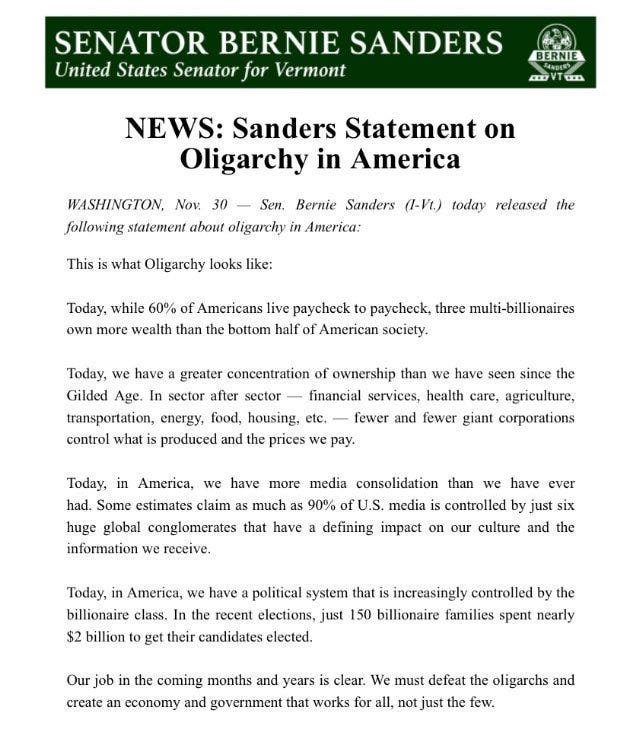"Paycheck-to-paycheck" and five other popular myths
Being educated and reading a lot on the internet is no proof against myth-conceptions.

The other day, Bernie Sanders released yet another statement in which he declared, in passing, that “60% of Americans live paycheck-to-paycheck”:

Although I do think that Democrats should focus on pocketbook issues, it must also be said that Bernie Sanders’ favorite economic factoid is a complete and total myth.
Ben Krauss has already written a great post debunking this myth over at Slow Boring:
The claim that “60% of Americans live paycheck-to-paycheck” comes from a survey by the fintech company LendingClub. The company refuses to release its survey methodology, but we can get a general idea from its website, which says: “For those Americans, [living paycheck to paycheck] means that they need their next paycheck to cover their monthly financial outflows.” So what LendingClub is probably claiming is that around 60% of Americans don’t have enough cash in their bank accounts to live off of for one month.
But LendingClub’s survey is probably just flat-out wrong about this. The Federal Reserve does a very careful annual survey called the Survey of Household Economics and Decisionmaking, or SHED.1 This survey asks whether people have a “rainy-day fund” sufficient to cover at least three months of expenses. And it pretty consistently finds that over half of Americans do have such a fund. This is from the Fed’s 2024 report:
Some financial challenges, such as a job loss, require more financial resources than would an unexpected $400 expense. One common measure of financial resiliency is whether people have savings sufficient to cover three months of expenses if they lost their primary source of income. In 2023, 54 percent of adults said they had set aside money for three months of expenses in an emergency savings or “rainy day” fund—unchanged from 2022 but down from a high of 59 percent of adults in 2021.
If more than half of Americans have enough money to cover three months of expenses if they lose their job, then mathematically it cannot be true that 60% of Americans lack enough money to cover just one month of expenses.
Meanwhile, the extremely careful and detailed Survey of Consumer Finances, which comes out every three years, finds that in 2022, the median amount of money that Americans had in their checking accounts was around $8000. That’s enough to pay a month of expenses for most Americans, since most Americans don’t spend $8000 a month (the median income being less than half that much).
In other words, a number of government surveys just contradict LendingClub’s survey. Why does Bernie Sanders choose to believe a survey by a payday lender with a secret methodology, instead of multiple surveys by the U.S. government with transparent methodologies? I guess being a “populist” means having to seize on the most eye-catching catastrophic numbers you can find, even if those numbers are almost certainly fantasy. Lying about how the economy is awful seemed to work just fine for Trump, so maybe if Democrats do it too, it’ll help win elections? I’m not sure about that. But in any case, the truth is the truth, and the myth is a myth.
In any case, this is one of quite a number of myths that a lot of educated Americans enjoy repeating back and forth to each other. The reasons they do this vary — some myths are just fun, others are basically tribal or political loyalty oaths, while others probably have no reason for persisting other than the fact that society hasn’t bothered to really crack down on them yet. But the persistence of a whole lot of what we used to call “urban myths” shows how our modern information-rich environment is no proof against viral misinformation.
So here is a list of five other common myths that I hear a lot of people repeat:
“Exercise doesn’t make you lose weight”
“Pay and productivity have diverged”
“America’s education system is lagging the rest of the world”
“Japan doesn’t allow immigration”
“America spends more on defense than the next ten countries combined”
Plus a special secret bonus myth at the end!



